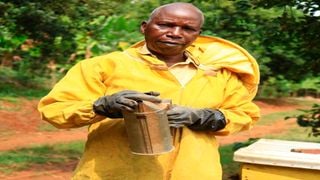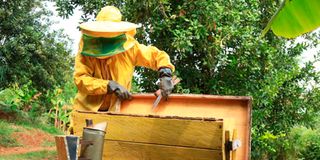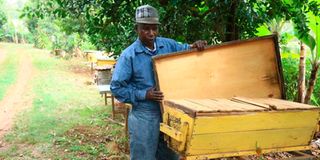
Gathirimo Kabuthi demonstrates how a smoker is used during honey harvesting at Baricho in Kirinyaga County on July 22, 2021.
| Joseph Kanyi | Nation Media GroupSeeds of Gold
Premium
I found buzzing business in bees, honey
What you need to know:
- Gathirimu Kabuthi harvests, packs and delivers the honey himself to his customers in a business that has seen him create a loyal clientele.
- For quality honey, says Kabuthi, one must have good forage around the farm for the bees to get nectar and a good source of water should be near.
A green sign post placed about a kilometre from Barichu shopping centre in Kirinyaga County welcomes one to Mukithi Bee Farm.
Tens of macadamia and avocado trees and banana plants flourish on the farm. From a distance, one can hear bees buzzing as they search for nectar and pollen from the plants.
Walking on the farm to ensure everything goes right is owner Gathirimu Kabuthi. The farmer welcomes the Seeds of Gold team and after exchanging pleasantries, he leads us to his apiary, located at the far end of the tree-acre farm, hosting 100 hives.
"I started beekeeping seven years ago with only five hives after injecting Sh15,000 capital in the business. Of the 100 hives, about 50 are populated,” he says, noting the number declined when the area was sprayed to controlled locusts.
Kabuthi recounts that the capital went on construction of the Kenya Top Bars hives that he uses. Each hive cost him Sh3,000. He later invested in harvesting tools such as bee suit, gloves and gumboots.
"The top bar hives have served me well for years but I want to diversify to Langstroth hives which host two or more boxes, meaning I will be able to increase my honey production.”
The Langstroth hive, according to him, has more space compared to the top bar making it easier to maintain the brooding chambers.
His interest in beekeeping was ignited by one of his uncles many years back, he recounts, who challenged him to keep bees to meet demand for honey that initially was used to treat ailments like coughs in children. To date, Kabuthi says demand for honey is too high that he barely harvests enough for his clients.

Gathirimo Kabuthi on his farm in Baricho in Kirinyaga County.
He harvests at least 500 kilos of honey after every four months when the conditions are right and sells at Sh1,000 each, all of it in less than two weeks.
"The usage of honey has broadened over the years meaning that beekeeping is one of the most lucrative businesses," notes Kabuthi.
According to the farmer, the first step into beekeeping is installing the hives to attract the bees.
"They should be clean and placed in a suitable place that is far from noise and human activities. The hives should also be kept at least a metre apart.”
Once this is done, he applies beeswax in the hives to attract the bees.
“It takes about a week before they fill up the first hive. It is usually a process as the insects first come to scout the hives, check if the conditions are right before returning to fill them.”
The first harvest comes in about nine months, but subsequent harvesting are determined by the flowering of the surrounding crops.
“In each of the hives there are about 60,000 bees. In a year, I harvest up to 10 litres of honey from a single hive. If the weather is good, preferably dry, one can harvest two or three times in a year. The drier the weather, the better for bees in honey production because when it is cold, they consume what they produce reducing the harvest.”
High quality honey
He starts harvesting the honey at about midnight because at that hour, he says, the bees are unlikely to get 'angry' and sting him.
He discourages farmers from smoking the insects as this sometimes compromises the quality of the honey. "When farmers smoke the hives to harvest honey, there are high chances of having smoke residue in the honey which is not good for the taste of the overall product.”
Kabuthi, 70, who runs the business with his wife and farms other crops, has not ventured into the retail market but sells the honey to his neighbours and customers referred to him.
After harvesting, he sieves the honey and then packages the produce in 100ml to one litre bottles that go from Sh100 to Sh1,000.
He plans to start making beeswax, candles and other products for extra income.
Kabuthi, who has trained at the National Beekeepers School located in Lenana, Nairobi, says having knowledge in the bees is key to success.
One of his main challenges is parasites that make bees to keep off the hives. “The most annoying are wasps. Beekeepers should constantly inspect their hives to get rid of them and others like ants.”
For quality honey, says Kabuthi, one must have good forage around the farm for the bees to get nectar and a good source of water should be near.

Gathirimo Kabuthi on his farm in Baricho in Kirinyaga County.
"One should ensure they do not use any chemicals on the farm to protect the insects. We are lucky that our neighbours only grow maize which do not require any form of spraying.”
To avoid adulteration of his honey, he does not sell to third parties but delivers the products to customers personally.
Kabuthi says the planned introduction of a bill to regulate the beekeeping sector is welcome but the regulations should be friendlier to farmers.
"What I like about the proposed bill is the insurance part because an incident can happen on the farm thus one gets compensated.”
Joel Masobo, a bee specialist from Egerton University, says to start beekeeping, a farmer should conduct a survey that will inform him on where the beekeeping should be done.
This includes doing floral mapping to check the availability of flowers for nectar production. Second, a farmer should consider security.
“Bees are dangerous and the hives should be kept not less than 100 metre radius from the main road, domestic animals and human beings,” he says.
He further stated that farmers should consider water resources as the bees need natural water either from a stream or tap to cool off the hive and dilute the honey. Thus there must be a constant supply of water.





